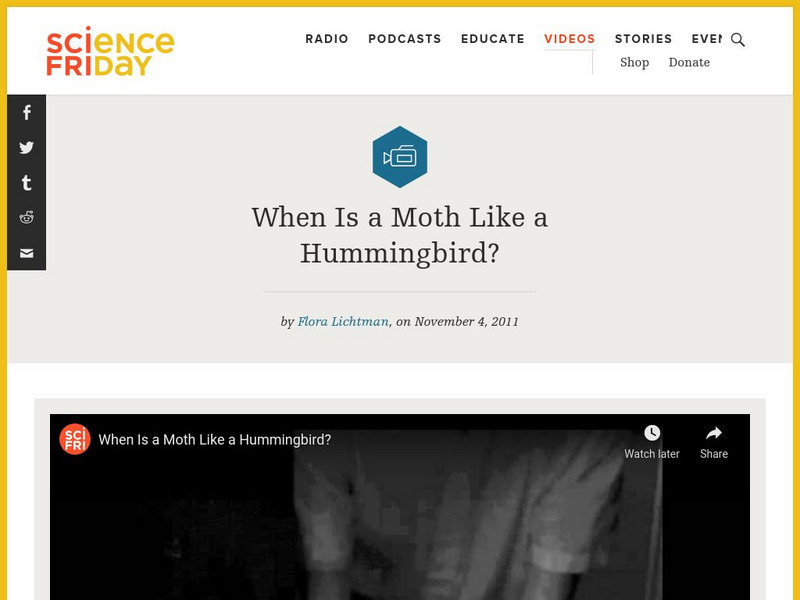Hi, what do you want to do?
Science Friday Initiative
Science Friday: How Science Can Keep Your Christmas Tree Merry and Bright
A horticulturalist explains everything one needs to know about choosing and caring for a live Christmas tree. Aired Dec. 14, 2012 [17:40 min]
Science Friday Initiative
Science Friday: Ask an Astrophysicist
Nobel Prize-winning astrophysicist Adam Riess takes questions on dark energy and the cosmos.
Science Friday Initiative
Science Friday: Humans, the World's 'Superomnivores'
Crispy foods appeal to most people. The author of the book The Omnivorous Mind: Our Evolving Relationship with Food talks about how humans have developed such an omnivorous diet. Aired May 25, 2012 [17:51 min]
Science Friday Initiative
Science Friday: How Homo Sapiens Became Masters of the Planet
Ian Tattersall, author of Masters of the Planet, talks about the origin of humans, and how Homo sapiens became a dominant species. Aired Apr. 6, 2012 [38:44 min]
Science Friday Initiative
Science Friday: Nothing to Sneeze At
Lydia Bourouiba and John Bush of MIT's Applied Mathematics Lab used high-speed cameras and fluid mechanics to reveal why we've grossly underestimated the role of gas clouds in sneezes. [5:03]
Science Friday Initiative
Science Friday: When Is a Moth Like a Hummingbird?
Understand how the hawk moth keeps a precise position in the air, with a UNC Chapel Hill biomechanist's study using high speed cameras. [4:06]
Science Friday Initiative
Science Friday: Tale of Two Tongues
Two recent studies explore tongue design and function- how they are used for lapping by dogs and for nectar retrieval by hummingbirds. [4:26]
Science Friday Initiative
Science Friday: Seeing Through the Eyes of an Armadillo
Sam Easterson has refined the art of the critter cam. He is the curator of the Museum of Animal Perspectives--an online repository of remotely-sensed wildlife imagery. All the footage comes from cameras implanted in the landscape or...
Science Friday Initiative
Science Friday: Cell Phone Radiation Affects Brain, Study Says
Researchers identify an effect of radiation from cell phones on the brain.
Science Friday Initiative
Science Friday: Going Green: Energy Conservation
When oil prices are high, people look for ways of reducing their energy use. Strategies to try are discussed in this program. Aired Jun. 20, 2008 [40:47]
Science Friday Initiative
Science Friday: Changing Climate Means Changing Oceans
From acidification and warming temperatures, to sea-level rise and sea-ice loss, Ira Flatow and guests look at how the oceans are changing with changes in climate.
Science Friday Initiative
Science Friday: A Coral Catastrophe?
A third of the world's reef-building coral species are vulnerable to extinction, a group of researchers says. We'll talk with one of the authors of a report about the plight of corals, and discuss whether anything can be done to turn...
Science Friday Initiative
Science Friday: How to Rate Energy Star?
Consumers often look for the Energy Star seal when buying appliances and devices. But is this a useful parameter when so many products meet this standard? And what other strategies could be used to change a person's behavior so that they...
Science Friday Initiative
Science Friday: Poop and Paddle
Adam Katzman, the inventor and builder of the toilet-boat, says it's meant to be more inspirational than practical. "Poop and Paddle" demonstrates how sewage and rainwater can be converted to cattails and clean water. [4:02]
Science Friday Initiative
Science Friday: How to Pick the Perfect Peach
A discussion with Russ Parsons, author of How to Pick a Peach: The Search for Flavor From Farm to Table, who talks about the history of food crop distribution, and the difficulty of buying produce that tastes fresh. Things are changing...
Science Friday Initiative
Science Friday: The Body Farm
Join Ira Flatow for a talk with Body Farm founder and forensic anthropologist Bill Bass on what bones can tell police about a crime. [17:24]
Science Friday Initiative
Science Friday: Childhood Vaccinations
When kids head back to school, there is always talk about the childhood vaccinations required in much of the country. Parental resistance to vaccines has diseases such as measles on the rise.
Science Friday Initiative
Science Friday: A Highway for Wind Power
Google, Good Energy, and other investors threw financial support behind an idea to build a multi-billion-dollar power distribution line for offshore wind farm projects. The company called it "a superhighway for clean energy," collecting...
Science Friday Initiative
Science Friday: Building a Synth, Bit by Bit
A toy kit made by littleBits and Korg teaches you how electronic music is made while you put it together.
Science Friday Initiative
Science Friday: Mold Compounds Sandy's Destruction
A community organizer and a mycologist discuss the incidence of mold in buildings hit by Hurricane Sandy three months earlier. Volunteers are stripping buildings of all materials contaminated by mold so the structures can be treated....
Science Friday Initiative
Science Friday: Olympic Ski Jump Training in the Wind Tunnel
In this video, we see how U.S. Olympic ski jumpers learn to perfect their aerodynamic technique with the help of a wind tunnel and a physics professor. Aired Feb. 4, 2014. [2:57]
Science Friday Initiative
Science Friday: Study May Link Pro Football, Brain Decline
A discussion with Everett Lehman from the National Institute for Occupational Safety and Health about a research finding that professional football players have a higher incidence of neurodegenerative diseases such as Alzheimer's and...
Science Friday Initiative
Science Friday: Technology Could Give Athletes an Edge at Olympic Park
Sports technology has been making huge advances in recent years. When Oscar Pistorius ran in the 2012 London Olympics, he ran on prosthetic legs. In this interview, Philippa Oldham from the Institution of Mechanical Engineers recommends...
Science Friday Initiative
Science Friday: 17 Year Cicadas Primed to Emerge
After spending 17 years underground, hear about the mysterious behavior of these periodical monsters!




























